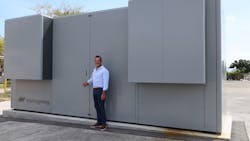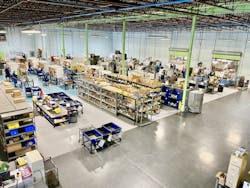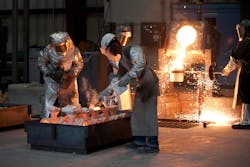Girard Equipment assembles manufacturing activities, transforms operations
Soaring fuel prices produced some of the funniest memes on the internet in March, but bulk transportation executives certainly weren’t laughing as the cost of diesel reached uncharted, margin-crushing territory.
Escalating energy bills aren’t the only pain point amid record inflation, either.
New and used trucks are exponentially more expensive, when carriers can find them, insurance premiums continue to go up, and driver wages are rising steadily amid a growing shortage of long-haul truckers—all of which combine to hike prices on every key commodity—forcing many trucking companies to raise rates.
The rare exception in these times is the price of Girard Equipment’s tank truck products.
“Everyone else has had price increases,” owner and president Tim Girard said. “We’ve had none—and we don’t anticipate any for quite some time.”
Pre-pandemic prices are so unexpected, customers barely believe it, Tim said. But it’s true, and the manufacturer’s fresh competitive advantage was made possible by his firm commitment to self-reliance, which reduced Girard’s dependence on outside suppliers to its most negligible level in the company’s 70-year history—just in time.
The centerpiece of Girard’s pricing resiliency is the newly established Vero Beach, Fla., headquarters, which now houses all of its operations—including an expanded foundry, machine shop, assembly lines, and offices—inside a greener building, enabling efficiencies helping to shield it from COVID-induced complications.
Girard’s foresight also opened new lines of cost-mitigating business as disruptive supply-chain shortages forced other companies to “reshore” their production. Third-party manufacturing now is its fastest growing segment.
“It’s actually been overwhelming because we didn’t know it was going to take off like that,” said Mike Fernandez, Girard’s production manager.
Equipment pioneer
Innovation and forward-thinking are the key to Girard’s sustained success, which now spans eight decades and three generations.
John L. “Jack” Girard, a talented tinkerer and Tim’s grandfather, founded the tank truck equipment company as Girard Rubber Company in 1952. Jack’s sons, John C. Girard and Bob Girard, helped grow the business, and John C., Tim’s dad, served as the company’s president from 1975 to 2002, when Tim succeeded him.
Their operations originally were located in Rahway, N.J., and later in Linden. Then, in 2009, Girard moved to Florida and established a corporate office in Vero Beach, a machine shop and assembly plant in nearby Gifford, and its first foundry—where it produces its own castings—in Fort Pierce, about 15 miles south.
After 10 years with this logistically challenging arrangement, Tim started to consider consolidating operations, and Girard finally merged its foundry, machine shop, and corporate offices at its new Vero Beach building in January 2021. It also maintains a service point in La Porte, Texas, and an international presence for European customers.
The company has specialized in pressure relief valves since the 1960s, when its leaders helped develop modern code specifications for cargo tanks. They started with valves for MC 300 series tanks and moved into DOT 400 series tanks in the 1990s. Today, pressure relief and hydraulic valves still account for 90% of annual sales, which no longer include “other peoples’ products” after Girard sold its third-party inventory.
That move allowed the company to focus on its proprietary product lines, while also avoiding competition with distributors who are buying and selling its products. “It’s more efficient to have a clean product list with equipment they can sell for profit,” Tim said. Girard now works with 200-plus distributors in North America.
“The legacy here is great,” Tim said, reflecting on the company’s 70th anniversary. “There are so many people who have contributed to the success of this business who deserve recognition. And it’s been an interesting ride for me. I’m 32 years in now, so I’ve made a career of it, and seen a lot of folks come and go. When I started going to trade shows (in the 1980s), I was the young guy. Now I’m one of the elder statesmen.
“So it’s cool to see the generational changes within our industry.”
Activities assembled
The timing for Girard’s all-in-one relocation couldn’t have been better.
Tim signed the lease agreement with the City of Vero Beach in December 2019, and they began improvements, and the movement of people and equipment, as the pandemic was arriving in the United States, so the 10-month disruption to production occurred while the world was slowing down for quarantine.
The 39,900-square foot building at 3455 Airport West Dr., near the Vero Beach Regional Airport, previously was occupied by Vero Beach’s transmission and distribution division, but was vacated after the city sold its electric utility to Florida Power & Light in 2018. So city officials wanted to lease the facility to a private-sector tenant who could maintain it, and keep a well-respected manufacturer, and its local jobs, in town.
“We’re happy,” Tim said. “We’re planning to stay put for a long time.”
He’s thrilled with the company’s vastly improved workflow. Production activities are easier to coordinate and manage under one roof, and bottlenecks are easier to identify and eliminate with all Girard’s operations now laid out in perfect alignment. “We’re melting metal on one side of the building, machining it in the center of the building, and then assembling, testing and packaging it on the other side,” Tim said.
A more cohesive layout unlocks cost- and time-saving efficiencies that help keep prices low, allows Girard to better track product quality through the entire manufacturing process, and enables synergies between newly combined foundry and machine-shop employees, who Tim says have morphed into a singular, 75-strong workforce. “It has worked out great,” he said. “Our people have jelled well all the way through.
“We’ve got good team culture, a great corporate team—and the best days are ahead of us.”
Supplying success
Fernandez, who’s been with Girard for 32 years, followed the company to Florida and helped to establish its first foundry. “Before we had a foundry, we outsourced all of our casting, whether it was casting manufacturers in Pennsylvania or overseas,” he recalled. “We relied on castings from them. Now we’re able to produce our own castings, so we can better manage overhead, as far as price and lead times.”
He estimates the first foundry halved their lead times. They’ve only improved since the foundry expansion, especially compared to manufacturers whose production has been constrained by supply-chain complications. Fernandez says they can make anything “in weeks,” and prioritize critical orders for expedited turnarounds.
The new foundry features 300- and 500-pound furnaces for creating different size parts using “investment casting,” which produces precise components while minimizing material waste, energy expenditure, and subsequent machining—all adding up to further savings. The process utilizes paraffin wax to create molds that are combined and cured on “tree stands,” then coated in multiple layers of ceramic, with increasingly coarse sand applied between dips. The forms are baked to melt out the wax and harden the shell, and liquid metal is poured into the void through the hollow tree. After the metal solidifies, the ceramic is removed, and the part is cleaned, machined, and polished before heading to assembly.
Tim says the new foundry enabled Girard to boost production by 30%, with capacity for further increases. Running 10-12 hours a day, five days a week and sometimes Saturdays, the foundry consumes up to 15,000 pounds of metal—including 316 and increasingly popular 2205 duplex stainless steel, all sourced from the U.S.—each month. And with eight to nine “pours” per day, Girard produces up to 18,000 parts a month.
“Having the foundry allows us to have more diversity with our products,” Tim said. “We don’t have to order 200 castings from another foundry and wait two months to receive them. I can do 60 castings in a week, and that might be all I need for the month, so I don’t have to bring in three months’ supply each time.”
Girard’s upgraded machine shop features 17 Mazak CNC machines and four CNC mills easily programmed and intuitively operated, Tim says. The company’s final products used in petroleum, chemical, and liquid foodgrade transportation include valves, vents, various fittings, hydraulic units, vacuum breakers, vapor recovery adaptors, manways, and much more. “There’s nothing we can’t make,” he said.
Machined parts are electrically polished to draw chromium to the surface, improving chemical resistance and appearance. “They look great, they’re easier to clean, and they’re also more resilient,” Tim said. After assembly, parts are tested, branded, laser-etched with serial numbers for easy identification, and packaged for fast shipping.
Producing opportunity
Customers aren’t the only parties benefiting from Girard’s augmented abilities.
As the pandemic made securing parts and components more difficult, especially for companies importing from China and other countries, Girard started offering casting and parts production to third parties. And as they began to realize Girard could make parts faster and cheaper than their international suppliers, interest in its manufacturing services as a smart supply-chain solution went “through the roof,” Tim said.
The business took off so quickly, he says they had to “pump the brakes” to ensure Girard didn’t overextend itself, and jeopardize production of its own unique products. Much of the work involves making valves for other companies, but they also can create molds and prototypes based on the designs brought to them.
“They used to buy overseas,” Tim said. “Now they’re buying domestically.”
By doing so, they’re also ensuring higher-quality, U.S.-made parts that last longer, Tim maintained. “Quality issues are one of the persistent perils with outsourcing production overseas,” he said. “I’ve been there myself.” Shoddy components, he asserts, are the unsatisfying result of unskilled craftsmen and inferior facilities. “We tell our guys, ‘Everything is in the pour,’” Tim said. When done incorrectly, integrity is compromised, and more waste is generated. “You have to be skilled at what you’re doing,” he insisted.
Growing forward
Girard’s currently taking a “measured approach” to outside production. But Tim said they’ll begin to ramp up activities over the next several months, as long as long as he’s satisfied they can maintain the ideal balance of proprietary and third-party manufacturing, and have the right employees in place to add a shift. “I want to see how everything impacts my regular business, but so far we’ve managed it well,” he said.
The company isn’t done bolstering its capabilities and product lines, either.
Fernandez said they’re looking at incorporating robotics in foundry processes, and utilizing hydraulic arms for welding. Automation could help them perform more tasks overnight, when it’s cooler outside, and minimize downtime between dips. “We’re researching that now to see where we should concentrate our resources,” he said.
Tim says Girard’s valve system packages, which include bottom and rear outlets, dome covers, and hydraulic pumps, are an increasingly popular choice for fleets. “That’s an area we’re growing in by leaps and bounds,” he said. The company also is expanding its offerings for foodgrade carriers, and fleets transporting compressed gasses—a hot market that also is fueling the demand for its third-party services.
And, while searching for ways to avoid contributing to inflation and grow the business, he’s also prepping the fourth generation of Girards he believes can lead the company into the next 70 years of success. Son Samuel, 19, is part of a school workforce initiative that promotes manufacturing, daughter Mia, 17, already boasts a savvy business mind—and both have expressed interest in one day leading Girard Equipment.
“I hope to see it happen,” Tim said. “I would love that.”
About the Author
Jason McDaniel
Jason McDaniel, based in the Houston TX area, has more than 20 years of experience as an award-winning journalist. He spent 15 writing and editing for daily newspapers, including the Houston Chronicle, and began covering the commercial vehicle industry in 2018. He was named editor of Bulk Transporter and Refrigerated Transporter magazines in July 2020.




